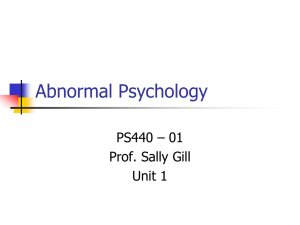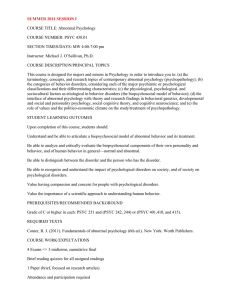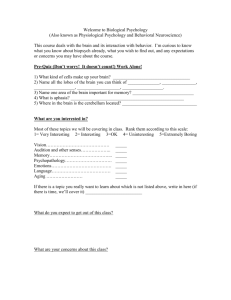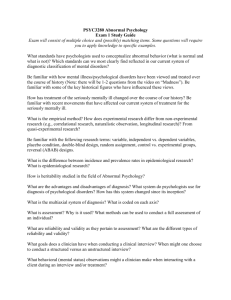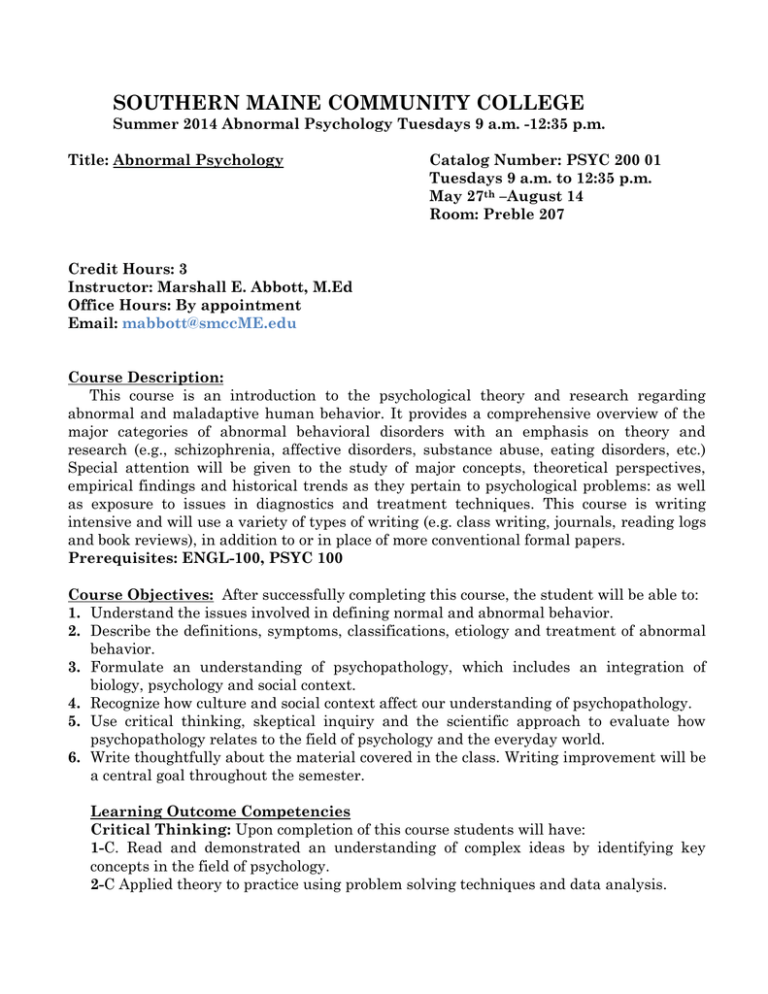
SOUTHERN MAINE COMMUNITY COLLEGE
Summer 2014 Abnormal Psychology Tuesdays 9 a.m. -12:35 p.m.
Title: Abnormal Psychology
Catalog Number: PSYC 200 01
Tuesdays 9 a.m. to 12:35 p.m.
May 27th –August 14
Room: Preble 207
Credit Hours: 3
Instructor: Marshall E. Abbott, M.Ed
Office Hours: By appointment
Email: mabbott@smccME.edu
Course Description:
This course is an introduction to the psychological theory and research regarding
abnormal and maladaptive human behavior. It provides a comprehensive overview of the
major categories of abnormal behavioral disorders with an emphasis on theory and
research (e.g., schizophrenia, affective disorders, substance abuse, eating disorders, etc.)
Special attention will be given to the study of major concepts, theoretical perspectives,
empirical findings and historical trends as they pertain to psychological problems: as well
as exposure to issues in diagnostics and treatment techniques. This course is writing
intensive and will use a variety of types of writing (e.g. class writing, journals, reading logs
and book reviews), in addition to or in place of more conventional formal papers.
Prerequisites: ENGL-100, PSYC 100
Course Objectives: After successfully completing this course, the student will be able to:
1. Understand the issues involved in defining normal and abnormal behavior.
2. Describe the definitions, symptoms, classifications, etiology and treatment of abnormal
behavior.
3. Formulate an understanding of psychopathology, which includes an integration of
biology, psychology and social context.
4. Recognize how culture and social context affect our understanding of psychopathology.
5. Use critical thinking, skeptical inquiry and the scientific approach to evaluate how
psychopathology relates to the field of psychology and the everyday world.
6. Write thoughtfully about the material covered in the class. Writing improvement will be
a central goal throughout the semester.
Learning Outcome Competencies
Critical Thinking: Upon completion of this course students will have:
1-C. Read and demonstrated an understanding of complex ideas by identifying key
concepts in the field of psychology.
2-C Applied theory to practice using problem solving techniques and data analysis.
3-C Have analyzed and evaluated research data to produce a well-reasoned argument or
position on an issue.
4-C Synthesized data from multiple sources to create and support a solution.
Global Citizenship: Upon completion of this course students will be able to:
1-G Explain how social interactions are influenced by local, regional, national and/or
global cultures.
2-G Recognize cultural and individual differences that underlie the complexities of
human behavior and social interaction.
Course Overview:
A warm welcome to Abnormal Psychology. My desire for you this semester is that the
learning experience will be informative and thought provoking. In addition to the course objectives
for the book and each chapter, it is my hope that you will learn to view your own life and experiences
so far, through the lens of psychology. The more that we learn about ourselves and the influences that
have made us who we are, the richer our own lives will be. My contact information is listed above. If
you are not able to make it to class, you need to let me know. If you miss two consecutive classes,
you will be dropped from the class.
Required Text: Abnormal Psychology in a Changing World 7th Edition by Jeffrey S. Nevid,
Spencer A. Rathus and Beverly A. Green: Pearson Prentice Hall
Course Requirements: Attendance and participation in class, weekly journal writing, classroom
writing exercises, reading logs, culminating written book review with class presentation.
CLASS ATTENDANCE AND PARTICIPATION
Because the class is primarily seminar/discussion/writing exercise based, it is essential that you attend
every class and that you participate in class discussions and class writing exercises.
Attendance is required. If you miss the first two classes you will be reported as a NO SHOW to the
administration and dropped from the class. Missing two weeks of class consecutively without
notifying me will result in you being dropped from the class and receiving an AF for the course
grade. Missing a total of two weeks in classes will result in a lower grade, and missing over two
weeks of class will result in class failure. Coming late and missing attendance may be counted as
class absence.
ALL CELL PHONES MUST BE PLACED ON VIBRATE. NO TEXT MESSAGING OR LAP
TOPS ARE PERMITTED IN CLASS.
Failure to abide by these policies will result in class dismissal, an unexcused absence and a 50 point
deduction from your course grade.
Participation:
25 percent of your grade will be based on your weekly journal writing. At the beginning of each
class you will present your journal writing to me to be noted in the grade book. I am not going to read
the journal writing for content (I will explain this in class). I believe in the power of regular journal
writing and encourage you to use the time this summer to become acquainted with the process.
25 percent of your grade will be based on class participation.
Reading logs will constitute 25 percent of your grade. The reading logs will be based on the
content of the text.
A final book review and presentation will make up 25 percent of your grade. At the beginning of
the semester you will select a book and I will authorize the book. I will provide a list of suggestions
for books, but you may choose one on your own, as long as I approve the selection.
You will prepare a report on the book that will be a minimum of three pages discussing the content
and how the book has enhanced your learning in this class. At the end of the semester students will
share the reports with the class.
Grading: All assignments must be completed in order to pass the course. No work will be accepted
after the last class. All weekly journal entries, regular reading logs and the final book review must all
be completed on the week that they are assigned.
Points are assigned as follows:
Reading Logs ---------------------------------------------------------------------100
Editing process of reading logs-------------------------------------------------100
Class attendance and participation---------------------------------------------100
Weekly Journal Writing---------------------------------------------------------100
Final Edited Book Report ------------------------------------------------------100
The maximum number of points is 500. Grades will be assigned as follows:
465-500 points=A
435-449 points=B+
385-399 points=C+
335-349 points=D+
0-312 Points=F
450-464 points=A415-434 points=B
365-384 points=C
313-334 points=D
400-414 points=B350-364 points=C-


